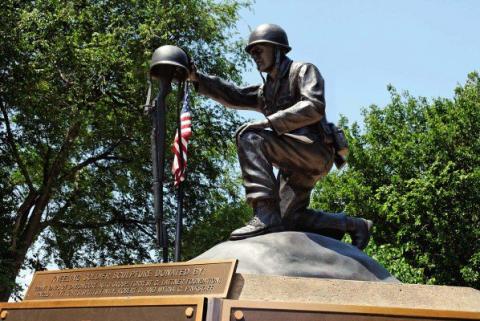Memorial Day 2009 - It's on days like this that I recall my experiences in the military and question the current direction of U.S. service. I spent nearly four years on active duty with the U.S. Navy during the Vietnam War era. I didn't volunteer because of patriotism or my belief in the war. I took the Navy gig instead of going into the Army as a draftee and possibly being sent into battle.
Although I was on a warship for nearly half of my enlistment, I never got near Vietnam and ended up spending my final two years at the NATO base in Keflavik, Iceland - a facility focused on tracking Soviet submarines in the North Atlantic.
I didn't love the military, and I doubted Vietnam increasingly as a result of the blatant propaganda we were fed from Washington. But I didn't hate my time either. I did interesting work that set my career in a particular direction. I experienced true American diversity for the first time. And I met dear friends with whom - even 40 years later - I remain close. Without the presence of a draft, I doubt seriously whether I would have entered the military.
Today, looking over the landscape of American military service, I wish more non-professionals were part of our armed forces. I believe deeply that the country, our government and our young people would all be better off with some requirement for national service.
To me, those of us who saw ourselves as civilians with temporary assignment to the military served as a prophylactic against the single-mindedness of the group we referred to as "lifers." We were ready at a moment's notice to disagree, protest and even go to our Congressional representatives if we witnessed the kinds of excesses that have marked our Iraq experiences. Our obligation remained to the home and family aspects of citizenship, as opposed to the military might of the nation.
Can the same be said for our all-volunteer military and for its extension, the paid mercenaries of Blackwater, KBR, etc? During my service, we sailors did all the work. We cooked, cleaned and carried heavy objects without a single paid civilian to help out. We were self-contained and suspicious of outsiders - especially consultants.
When we came out of the military, we were not treated as pariahs (as frequently reported), but instead were welcomed into the workforce by recruiting agencies that represented major businesses. I got a job at a veterans' weekend event run by one of those firms, and worked for that company for 20 years.
I don't want to suggest that military service is a necessary route to maturity and success. It may be so for some people, but that's not the reason I regret the loss of national service for more of our population. It is the risk to our nation of creating and supporting a fully professional military rather than relying on citizen-soldiers for at least some of our fighting men and women. They serve as a bulwark against tyranny by a possible military class. They self-regulate the armed services and guarantee the civilian control of the world's most powerful military machine. And they are much less likely to put up with the excesses of Blackwater and KBR, or the kind of mistreatment that occurred at Abu Ghraid and Guantanamo.
The men and women in our current military deserve our honor. Their deaths and injuries are tragic reminders that freedom often requires sacrifices. But our nation now rejects the concept of "shared sacrifice" that is innate in a draft system and in the ranks of citizen-soldiers.
